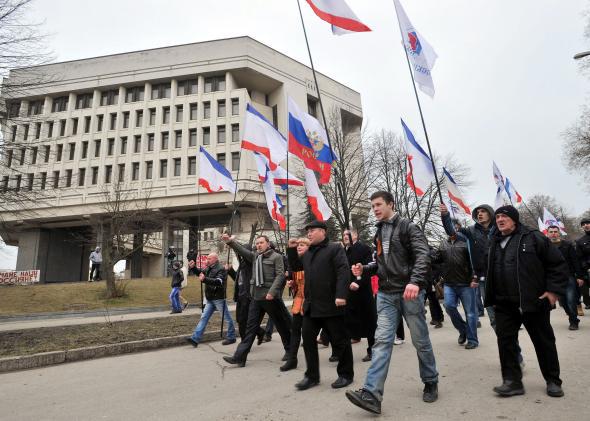Given the degree to which this weekend’s events in Crimea seem to have caught the world off guard, I was curious to see if the Wikileaks cables contained any discussions by U.S. diplomats of a scenario like this one. Indeed, there is some now ominous foreshadowing to be found.
A 2006 cable under the name of Kiev Deputy Chief of Mission Sheila Gwaltney, who as it happens is now the highest ranking diplomat at the U.S. embassy in Moscow following the departure of Amb. Michael McFaul, warns of a possible Russian threat to Crimea – Ukraine’s “soft underbelly”:
Discussions with a wide range of contacts in Crimea November 20-22 and officials in Kyiv discounted recent speculation that a return of pro-Russian separatism in Crimea, which posed a real threat to Ukrainian territorial integrity in 1994-95, could be in the cards. However, nearly all contended that pro-Russian forces in Crimea, acting with funding and direction from Moscow, have systematically attempted to increase communal tensions in Crimea in the two years since the Orange Revolution. They have done so by cynically fanning ethnic Russian chauvinism towards Crimean Tatars and ethnic Ukrainians, through manipulation of issues like the status of the Russian language, NATO, and an alleged Tatar threat to “Slavs,” in a deliberate effort to destabilize Crimea, weaken Ukraine, and prevent Ukraine’s movement west into institutions like NATO and the EU.
The cable notes that “the most active pro-Russian actors highlighted by our contacts were the Russian Society of Crimea and its affiliates, the Russian Bloc political party and the Crimean Cossack Union.” Russian Bloc has been particularly active in the last few days. setting up roadblocks on important highways in the region.
The cable quotes a member of Ukraine’s National Security and Defense Council, claiming that “While there has always been overwhelmingly pro-Russian sentiment in Crimea’s population, the beginning of systematic, organized efforts by pro-Russian groups backed by Russian money is a relatively new phenomenon.” Other officials acknowledge the “degradation of Kyiv’s ability to assert central power and authority.”
An Oct. 5, 2009 cable discusses a visit by the visiting Assistant Secretary of Defense Alexander Vershbow, now Deputy Secretary General of NATO. In the read-out, Ukrainian officials don’t appear very optimistic that Russia’s treaty obligations, included the now-much-discussed Budapest Memorandum, would do much to prevent a Russian military incursion (my emphasis):
On security guarantees, ASD Vershbow said that the U.S. regarded the 1994 Budapest memorandum to be still in effect, regardless of the expiration of START in December.
We expect Russia to abide by the assurances in the memorandum, as he had stated publicly that afternoon in a speech to the Ministry of Foreign Affairs’ Diplomatic Academy. Russia is legally bound to respect Ukraine’s territorial integrity through a number of agreements as well.
While such documents are important, just as important is building up Ukraine’s own strength and thickening Ukraine’s ties with the U.S. and other Western countries, so as to establish “facts on the ground.” That is why enhancing our military and security cooperation in concrete ways is critical. In addition, the Budapest memorandum and the NATO-Ukraine Charter contained provisions for consultation in times of crisis.
Responding, Former FM Ohryzko asked, rhetorically, whether such consultations would matter if Russian forces were to take over Crimea. He noted that Russia had violated its commitments in attacking Georgia and had not been punished for this.
Four days later, the embassy in Kiev issued another cable, titled “Ukraine-Russia: Is Military Conflict No Longer Unthinkable?” It discusses the views of defense analysts Volodymyr Horbulin, Ukraine’s former National Security Advisor, who believed that “internal Russian considerations are pushing Russia toward a confrontation with Ukraine prior to the expiration of the Black Sea Fleet basing agreement in 2017.”
The cable followed a highly critical letter sent by Russia’s then president, Dmitry Medvedev, which was interpreted by many as a warning to Kiev over its pro-Western policies. The cable notes (my emphasis):
While Horbulin believed that Russia has many non-military levers with which to influence Ukraine (above all, by stirring up trouble in the Crimea), he did not rule out the use of military force, especially if Ukraine’s new president proves not to be as pliable as the Kremlin may hope.
…Horbulin characterized the Medvedev letter as unprecedented in the brazenness of Moscow’s attempt to interfere in Ukraine’s upcoming presidential election, with the message that “whoever becomes (the next Ukrainian) president must follow in the wake of Russian policies.” Since the 2008 Russian invasion of Georgia, Russian military action against Ukraine is no longer unthinkable.
So it certainly doesn’t appear that a scenario like what’s playing out right now in Crimea was totally unanticipated. But neither the Ukrainian government nor U.S. officials appear to have thought of a way to prevent Russia from laying the groundwork for it.
